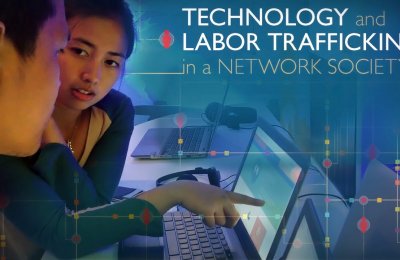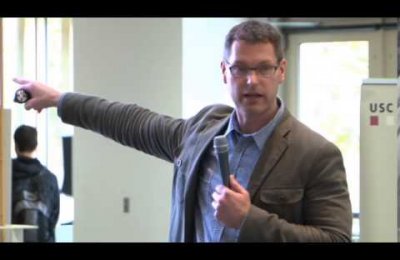By Gretchen Parker
“Draw. No matter what.” That’s the advice underground cartoonist Carol Tyler, known for her richly layered autobiographical comic stories and novels, gave to students who gathered for her talk with USC Provost’s Professor Henry Jenkins as part of the USC Visions and Voices series on Jan. 31.
Tyler, who teaches a class on comic, graphic novels and sequential art at the University of Cincinnati, recently published a three-volume graphic novel “You’ll Never Know,” to tell the story of her father’s experience as a World War II veteran and how it shaped her family’s history.
It was the first book of the trilogy, “A Good and Decent Man,” that caught Jenkins’ eye as he began research for a book he’s writing about comics. His tentative title: “Comics… and Stuff.”
“I’m interested in the stuff of everyday life… the sense of material culture that we surround ourselves with,” said Jenkins, who is USC Provost’s Professor of Communication, Journalism, Cinematic Arts and Education. He spoke to an audience gathered in USC Annenberg’s auditorium, on a stage spread with the papers, pens, hats, flowers, and the lining of Tyler’s father’s military jacket – all things, she said, that illustrate her muse and her process.
“Democratic debris,” as Jenkins called it, “carries cultural memories, carries emotional baggage.” His interest lies in exploring how we deal with the baggage and work with it. “My idea is that comics are a particularly powerful medium for exploring these memes, in part because there’s such a rich layer of texture and detail built into it.”

“There are so many details in the book that left me feeling like I knew Carol and the world she grew up in. I was intrigued by the power of the graphic novel to tell the story of the greatest generation, as they’ve been called,” he said.
At the same time, the medium lets us “puncture that story… to look beneath the hood, so to speak, to understand what she titled one of the books – ‘Collateral Damage’ – that may still be experienced from that generation’s exposure to World War II and its aftermath,” Jenkins said.
Tyler, as an underground comic artist in the 1980s in San Francisco, became known as one of the women leading the movement. She was part of an influential anthology called “Twisted Sisters” and “Wimmen’s Comix.”
Early on, Tyler, whose pen name is C. Tyler, began using her personal experiences as material for her stories and books.
“I always felt like I was fair game – my own life. Whatever it takes to get the idea across,” she said. “I want there to be a resonating truth in everything I say.”
“You’ll Never Know” was sparked by a phone conversation between Tyler and her dad, when he unexpectedly opened up to her about the “rivers of blood” he’d seen as a soldier in World War II. After hours of interviews with him, she expanded his memories into a fully fleshed out story of her life and her parents’ lives.
On his blog, Jenkins elaborated on the emotion that drove Tyler’s work and that of other graphic storytellers:
“If the father is stingy with the personal memories he is willing to share, even within the privacy of the family, his daughter fits within an exhibitionist streak in graphic storytelling which was partially initiated by the pioneering work of her husband, underground cartoonist Justin Green: she uses comics as a vehicle to work through personal issues and break down the culture of silence that informed her childhood. Ultimately, the books are designed as a tribute to the “greatest generation,” but they also speak with empathy about what happens when you bottle up so many powerful emotions, allowing them to come out only through actions and not through words and images.”
And Jenkins explores his interest Tyler’s expression of how her family’s emotions played out through “stuff” – both material possessions and emotional baggage:
“Throughout the book, we learn about the characters through their interactions over stuff, such as the time when her father, jealous of the attention his wife is receiving, walls up several hundred carefully addressed Christmas cards behind a dry wall he is constructing, or a powerful story about what happens to the father’s old army jacket.”
Throughout the trilogy, Tyler uses material items to delve into the emotions they carry with them. A watercolor her mother did, after suffering a stroke, photos of her dad in boot camp, wartime letters home and his old Army jacket.
“You look at a patch on Dad’s coat, and he was wearing it – when? When he had no knowledge of time or space and he had a head injury, and he was out of his mind somewhere in Belgium?” Tyler said.
“I realized early on I was dealing with heavy, heavy topics here. I was going to deal with my dad’s emotional life and what the causes were, my own problems,” and even the death of her younger sister, at the age of 2.
A theme of the book, “not all scars are visible,” comes through again and again. “That’s what this book is about for me. There’s so much emotion I had to deal with,” she said.
Tyler said her colleagues were surprised when they heard she was working on a book about war.
“But it clearly was not going to be a book about war; it was going to be a book about relationships,” she said. “Relationship is everything. One’s relationship to the world, to each other, to your materials, to you time – is everything. And that’s what I wanted to focus on. How this time and place affected him.”
Tyler also shared her work process with Jenkins and the audience, and she explained how she tries to imprint and recall memories. “I trained my mind to pay attention to every moment. Every moment is simultaneously new and extinct. And if I’m not awake, I’ll miss it. And I try not to miss anything.”
Most importantly, Tyler said, she reminds herself to work – no matter how life interferes. As she wrote the third book of the series, family members suffered serious illnesses all around her. Between hospital visits and caretaking, she continued “dipping the pen, lettering the book.”
“So, you draw,” she said. “No matter what.”
The Visions and Voices event was organized by USC Annenberg and co-sponsored by the USC Gender Studies Program and the USC Comic Book Club.








